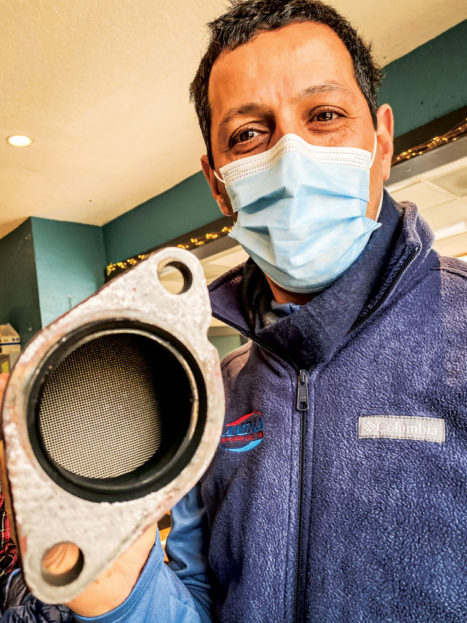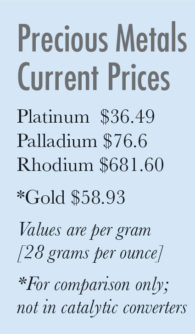
Mohammed, owner of Amina Auto, holds a catalytic converter. His shop saw five cars with stolen catalytic converters in the third week of February.A
A mining geologist sent this correction regarding the value of precious metals: Precious metals like gold, platinum, and palladium are priced in dollars per troy ounce, not common avoirdupois ounce, which we usually think of as ounces. A troy ounce is about 10% heavier and equals 31.103 grams rather than the 28.35 gram conversion used in the article. Thus 1 troy ounce of platinum priced at $1742.85 (the price on 2/28/21) equaled $56.03 per gram.
If you have a gas-powered vehicle, you have three to seven grams of precious metals in your catalytic converter. Thieves have tuned in to the rapidly rising prices of palladium, platinum, and rhodium and, as a result, catalytic converters are disappearing from cars at a record pace. The Denver Post reported on Feb. 18 that catalytic converter thefts had increased 1,600% from 2019 to 2020. And the total thefts in January 2021 had already reached 42% of the 2020 thefts.
A Minnesota legislator has introduced a bill to make it harder for thieves to sell stolen catalytic converters to scrap dealers or on the black market, so police and prosecutors will have a tool to combat the rising thefts. A Feb. 9 New York Times article said the soaring price of the metals in catalytic converters “may be accelerating the shift to electric cars.”
Anthony, the service manager at Kearney Garage in Park Hill, says they had three cars with stolen catalytic converters the second week in February; in the prior year they probably saw a couple a month. Many of the cars weren’t even parked on the street, he says, they were in their own driveways. He suggests a car alarm could help deter the thieves, sounding off in response to someone touching the car.
 Mohammed, the owner of Amina Auto Repair in northwest Aurora, has had 13 cars with stolen catalytic converters this year. “It used to be bigger cars with higher clearance to get under them more easily,” he says. But recently he’s seen Priuses, Corollas, and Honda Elements. “One family had the catalytic converters stolen off both their Elements in the same night.” Another customer had been cleaning his garage, so he parked his Prius on the street overnight. The next morning the catalytic converter was gone, and the car was left jacked up on a block. Older cars are just as susceptible as newer ones.
Mohammed, the owner of Amina Auto Repair in northwest Aurora, has had 13 cars with stolen catalytic converters this year. “It used to be bigger cars with higher clearance to get under them more easily,” he says. But recently he’s seen Priuses, Corollas, and Honda Elements. “One family had the catalytic converters stolen off both their Elements in the same night.” Another customer had been cleaning his garage, so he parked his Prius on the street overnight. The next morning the catalytic converter was gone, and the car was left jacked up on a block. Older cars are just as susceptible as newer ones.
Colorado has adopted California’s stricter emission requirements. Replacement parts now need to meet the higher standard. “Where we used to get universal or after-market parts for $600 – $700, they are now $1,200 – $1,400. The repair cost for a Prius is $3,000 with the additional damage that occurs,” says Mohammed.
A further problem is getting parts. “Currently Corollas have a three-week back order—and you don’t know if you’ll really get it in that time,” says Mohammed. There is no temporary repair option while awaiting the parts. “It’s illegal to put in a ‘straight pipe’ to the muffler and run the car without a catalytic converter, releasing fumes into the air.”
It takes only two minutes to cut the pipes at both ends and remove the catalytic converter, says Mohammed. Amina mechanics have built customized cages to make it more difficult to access the catalytic converter. “The thick metal would dull their blades and it would make more noise and take too long, deterring the thieves,” says Mohammed.
The reason catalytic converters need the precious metals? “Pollutant gases are made of harmful molecules, but those molecules are made from relatively harmless atoms,” according to the educational website explainthatstuff.com. Inside the catalytic converter, the gases from the engine pass through a dense honeycomb coated with the platinum-like metals. The metals cause chemical reactions that break apart the pollutant gases and convert them to gases safe enough to blow into the air.


Still poisonous gasses out the exhaust.